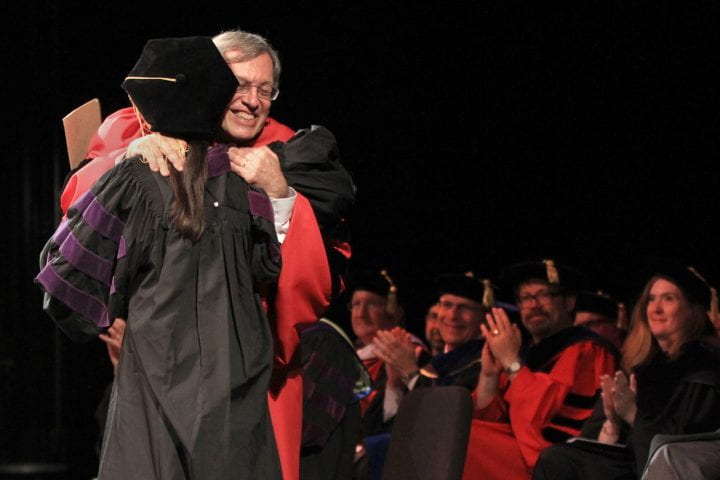A class act
Among other achievements, the 58 members of the School of Law’s class of 2012 helped define UCI’s pro bono program, establishing the school as a true champion of public interest legal education with a strong emphasis on experiential learning.

The UC Irvine School of Law’s inaugural class, which graduated Saturday, May 5, amassed impressive academic accolades, as expected, but also passionately pursued public service over the past three years.
Among other achievements, the 58 members of the class of 2012 helped define UCI’s pro bono program, establishing the school as a true champion of public interest legal education with a strong emphasis on experiential learning.
Students were eager to provide legal services to the underserved from the moment the program was launched. About 98 percent of the inaugural class participated, working 5,323 pro bono hours during their time at UCI.
The class of 2012 also began the UC Irvine Law Review and published four issues of Volume 1. The first featured faculty articles about the practical training of lawyers and other innovations at the law school, and the other issues were collections of scholarly papers from UCI Law symposia on patent law, legal history and environmental law.
In addition, the class started the Student Bar Association, the student governance group; a moot court program; and about two dozen other organizations, including the Orange County Human Rights Association, the underRepresented Student Alliance, the Environmental Law Society, the Federalist Society, and the Public Interest Law Fund, which raises money for student stipends for summer work with public interest groups.
UCI Law pushed the envelope by asking its students to log far more pro bono hours than sought at other law schools: 120 hours over three years. This let all classes experience the challenges of balancing public service with other career responsibilities. In the graduating class, 24 of 58 students met or exceeded the 120-hour benchmark. Seven of these – or 12 percent of the class – completed more than 200 hours of pro bono work, and two – Lauren Davis and Andrea Feathers – surpassed 300 hours.
Feathers, who worked 323 pro bono hours, won the school’s Pro Bono Independent Spirit Award in April for her efforts to seek out projects of interest to her. She spent the majority of her time at the Disability Rights Legal Center, the Orange County public defender’s office, and the Prison Law Office.
Sam Lam and Mohammed Elayan were the first class members to tackle a pro bono case, beginning during winter break of their first year. They assisted in an asylum matter on behalf of an Iraqi man held in a detention facility in San Diego after fleeing his native country because of religious persecution. Thanks to the students’ diligent work, the judge released their client and allowed him to remain in the U.S. The students’ passion inspired many others to volunteer with the Iraqi Refugee Assistance Project through a local chapter that Lam helped launch.
Luke Boughen and Gregory Mintz used their pro bono efforts to advocate for public beach access in Dana Point on behalf of the nonprofit Surfrider Foundation. The court ruled for Surfrider, ordering Dana Point to open gates and allow public access to the beach.
During spring break 2010, six students from the inaugural class travelled to Miami and met with detained Haitians who had fled their homeland after the devastating Jan. 12 earthquake. They helped prepare petitions for humanitarian parole into the U.S.
Over the past two winter breaks, students also travelled to Biloxi, Miss., to assist clients of the Mississippi Center for Justice in the wake of Hurricane Katrina, the Gulf oil spill, and the closing of a historically black school for allegedly racist reasons.
In addition, class members participated in one- and two-day Justice Bus trips on weekends and breaks to rural and isolated areas to aid farmworkers, victims of loan scams, the elderly, those in need of family law assistance, and families with children requiring special education.
These students will certainly continue to make a mark after graduation. More than a quarter of them – 15 – have landed prestigious clerkships with federal and state judges. Many others will soon be working for top law firms, including Gibson, Dunn & Crutcher LLP; O’Melveny & Myers LLP; Jones Day; Milbank, Tweed, Hadley & McCloy LLP; Manatt, Phelps & Phillips LLP; Bryan Cave LLP; Crowell & Moring LLP; Foley & Lardner LLP; Stradling Yocca Carlson & Rauth PC; Allen Matkins Leck Gamble Mallory & Natsis LLP; and Knobbe Martens Olson & Bear LLP.
Several have been hired at smaller law firms. One student will serve as a fellow at the Orange County district attorney’s office, and another will pursue a degree in environmental science & law at the University of Sydney.
It was clearly an impressive first class for UCI’s School of Law. Each member received a privately funded full-tuition scholarship, which will let them embark on their legal careers unencumbered by large debts. They were among only 4 percent of applicants accepted that first year, and it showed. The class was comparable to those of top-20 law schools in terms of median grades and LSAT scores. Slightly more than half are women, and nearly 40 percent are students of color. Their median age is 25.
At Saturday’s commencement at the Irvine Barclay Theatre, Dean Erwin Chemerinsky welcomed an audience of about 800, including families, faculty, staff and school supporters. UCI Executive Vice Chancellor & Provost Michael Gottfredson and Chancellor Michael Drake made preliminary remarks. Jean Su – a member of the law school’s first Jessup International Law Moot Court team – was chosen by her classmates to offer graduate reflections, and Senior Judge Harry T. Edwards of the U.S. Court of Appeals for the District of Columbia Circuit delivered the commencement address.